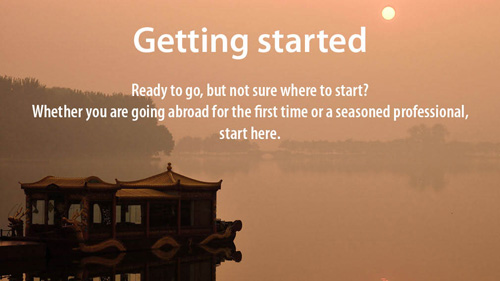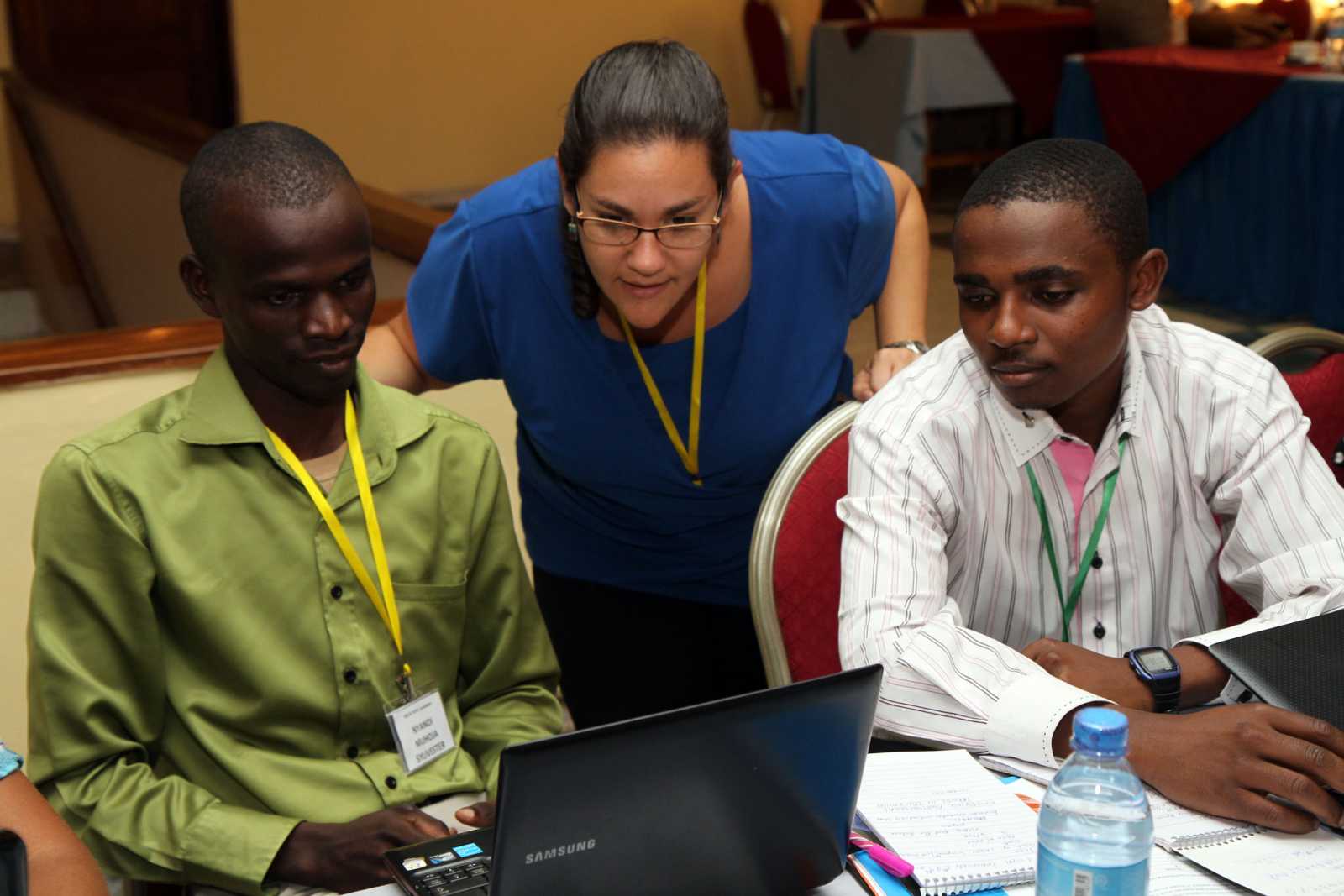- Name: Laura Alexander
- Age: 33
- Home town: Washington, D.C.
- Education: B.S. in Journalism and Communications, University of Florida; MPA, Syracuse University’s Maxwell School; M.A. in International Relations, Syracuse University’s Maxwell School
- Current position: VEGA Senior Program Manager and Director of Farmer-to-Farmer Special Program Support Project
- Bio: Program Manager for Organizational Transformation, Innovative Agricultural Research Initiative; Peace Corps Volunteer, Tanzania
- Years in the field: 5
- Countries I've worked in: Tanzania
- Country: Tanzania
- Region: Africa
- Sector: Agriculture, Environmental, International development
- Degree subject: Communications, International relations, Journalism
What does your organization do and how does your role fit within the goals of your organization?
VEGA is a non-profit organization that brings together its members to implement economic growth projects overseas. Our member organizations incorporate highly skilled volunteers into most or all of their programs.
VEGA has managed 36 programs in 28 countries, and our overall focus is to build sustainable enterprises that contribute to prosperous economies. By bringing together our Member organizations as implementers, we are able to put programs into the field quickly and efficiently, monitor progress, share outcomes, and, when appropriate, incorporate highly-skilled volunteers.
My primary responsibility at VEGA is managing the Farmer-to-Farmer (F2F) Special Program Support Project (SPSP), a USAID-funded activity that supports innovative approaches to using volunteers in international development initiatives. SPSP funds special projects that draw from non-traditional sources of volunteers and develop the capacity of non-traditional volunteer organizations.
As the project’s director, I’m responsible for planning and coordinating activities, monitoring performance and achieving targets, managing resources, supporting and monitoring grantees, and ensuring that the program is responsive to the needs of USAID and the larger Farmer-to-Farmer community. Since VEGA is an organization dedicated to implementing volunteer-driven economic growth projects overseas, F2F is a natural fit.
How did you get your job?
By applying to an online job advertisement! Everyone is constantly emphasizing the importance of networking in finding new positions—and there is no doubt that anyone who is conducting a job search should actively engage their existing networks and reach out to new connections. However, personally I’ve had success landing positions where I didn’t have an existing connection. I believe that following a careful search and application process, including thoroughly and regularly searching for new job postings, being selective and strategic on which opportunities I’ve responded to, and taking the time to customize every cover letter and resume I send out has helped me get in the door even when I don’t have a personal connection.
There are certainly many hard skills that I use daily in my work. Some of the most important include budgeting, program development, grant management, and evaluation. However, in my opinion softer skills, like leadership, communication and good judgment, are even more important. Building these skills takes time and effort, but they are well-worth the investment.
Most of my agriculture knowledge has been built up on the job. However, I do have a minor in Environmental Horticulture, which gave me some basics. Additionally, I served in the Peace Corps as an environmental education volunteer. By working with community groups as they implemented agriculture-based economic development activities, I gained exposure to a range of technical areas, including animal husbandry, permagardening, and agribusiness. Although my job does not directly involve the application of agricultural expertise, having a basic understanding of the field allows me to manage programs more effectively and to establish credibility with implementers.
What type of educational background do you believe is most relevant to working in this field?
I believe that formal education is very important in this field simply because there are so many interested applicants. It’s difficult to get noticed without a masters degree, and getting beyond entry-level without an advanced degree is even tougher.
However, really standing out in this field requires a combination of education and international experience. There is no substitute for relevant field experience.
I’ve found that there are two main paths into international agricultural development: 1) People who study agriculture and related fields who stumble into international opportunities through their work and 2) international development professionals that end up working for an agricultural project and build out that niche even though they don’t have formal training in agriculture.
I’m the latter, and I would definitely encourage people who are interested in international development more generally to consider focusing in on agriculture. It’s both a terrific field and one that seems to draw less attention from generalists than fields like health and education. Take some relevant classes if you’re still in school, or seek out an internship or volunteer experience that is related to agriculture. You’ll give yourself an edge with a lot of interesting organizations.
How has your job allowed you to travel?
In my current role, I travel a few times a year to visit and support grantees. Destinations are driven by where we have programs and where oversight is most needed, and trips usually last a week or less.
Previously, I spent two years in Tanzania as a Peace Corps volunteer working on environmental education at the local primary school and supporting community groups to develop and implement agriculturally-based economic development activities. I later returned to Tanzania and worked for a Feed the Future project. Based in Morogoro, I worked directly with stakeholders at Sokoine University of Agriculture on a variety of organizational capacity building activities.
What do you enjoying the most about working abroad, both personally and professionally?
There are so many different roles in the field of international development, and the view from DC with occasional trips abroad is very different from living and working in a developing country.
I enjoy being based abroad because I enjoy the challenges and reflection that come with constantly navigating another culture and another language. My understanding of the world and human nature is very different from what it would be if I never left the US for more than a month. It is also very rewarding to work more directly and form stronger bonds with beneficiaries. This is both a personal and professional benefit of being based abroad, as greater understanding of the local environment always enhances program design and implementation.
What have been some of the personal challenges that you’ve faced while working overseas?
It is difficult being far from family and friends. Although communication has never been easier, sometimes you just have to be present—and being abroad inevitably means missing small occasions like birthdays and big occasions, like weddings and funerals.
Additionally, although being constantly immersed in another culture is one of the things I enjoy most, it is also a challenge. Many people will always view you as a foreigner. It’s certainly understandable, but being treated like an outsider and defined by your foreignness in the place that you consider home can be difficult.
What are some professional challenges that you’ve encountered working cross-culturally?
Sometimes it is difficult to deal with the fact that professional expectations might be very different for the people/places you’re working. For example, in Tanzania many people do not prefer to use email for correspondence, and it is certainly not a common medium for official correspondence. If you have not printed and sent over a physical document for the files, you might find that any verbal or email agreement means little.
Other common challenges include dealing with differences in perceptions of time, work ethic expectations, power dynamics related to position, gender, and age, and perceptions of right and wrong.
As someone who has found success working abroad, is there any advice you might have to offer those who are thinking of taking their career outside of their own country?
My advice:
1. Find a way to get meaningful experience. This means spending more than a few weeks in a place that is very different from home. Volunteer programs are a terrific way to do this, but beware of experiences that are more tour than service. Getting experience is crucial to proving, both to yourself and others, that an international career is right for you.
2. Define your expectations—and then throw them away. The aspects of building an international career that you expect to be challenging often turn out to be non-issues, while things you never even imagined turn out to be the most difficult to deal with.
3. Remember that your way is not inherently “right.” It’s easy to fall into the trap of thinking other people aren’t doing things properly just because they’re not doing them as you would. Taking a step back and recognizing that there are often underlying issues at play often makes it easier to find common ground.
Add to Favorites


